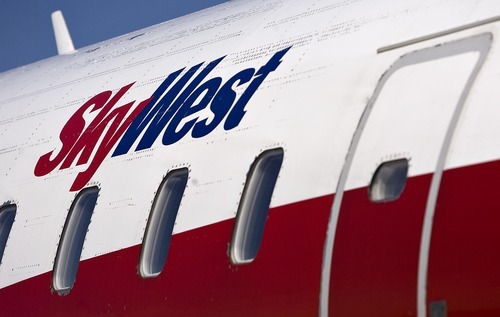This is an archived article that was published on sltrib.com in 2011, and information in the article may be outdated. It is provided only for personal research purposes and may not be reprinted.
In light of another disappointing financial quarter, SkyWest Inc. President Brad Rich was unusually candid in his remarks to stock analysts Wednesday.
Rich spared no time acknowledging that the regional airline holding company's performance fell short of expectations. Without prompting he also confronted rumblings that SkyWest may have bitten off more than it could financially chew when it bought ExpressJet last November.
"Obviously, our performance has not been what we've expected, not just in the second quarter but for two consecutive quarters now," Rich said during a teleconference to discuss the company's essentially break-even results.
"We are dealing with some challenges and some fairly strong headwinds, some consistent with our first quarter and, admittedly, some that are new to the second quarter."
SkyWest earned $1.6 million, or 3 cents per share, in the quarter ended June 30. But it would have reported a loss if not for an offsetting $3.3 million tax benefit. Last year, SkyWest pulled in a profit of $18.7 million, or 33 cents per share.
The weak quarter wasn't unexpected. Last month, SkyWest warned investors that net income would be substantially lower than first thought. The airline blamed, among other things, additional crew expenses related to increased flying for its large-carrier partners, pilot shortages and costs associated with acquiring and integrating ExpressJet into SkyWest's Atlantic Southeast Airlines subsidiary.
Still, investors showed their displeasure Wednesday. SkyWest's stock fell 3 percent, to close at $13.30 per share, off 43 cents.
After assuring the analysts that SkyWest's top managers "recognize" their "responsibility" to diagnose the company's problems and fix them, Rich tackled critics of the ExpressJet acquisition.
"It probably is not a surprise to know that I've been asked frequently if I still think the acquisition was a good idea. We have had some people even suggest that the transaction was simply more than we could handle," he said.
"Let me tell you what I believe about the transaction. I believe the fundamental strategic objectives of acquiring ExpressJet are unchanged. ... There have certainly been some significant challenges that we have underestimated, and we do need the cooperation of all work groups to be successful.
"But in spite of the challenges, we are right on plan with our integration target and we are on track to have Atlantic Southeast Airlines and ExpressJet fully integrated by the end of the year."
Helane Becker, an airline analyst with Dahlman Rose in New York, said SkyWest's tiny profit was disappointing, but not a wake-up call.
"My thought has always been that acquisitions take twice as long and cost twice as much to put together. It's not surprising that they are having issues with cost headwinds," Becker said.
"These guys are used to a very high level of performance and success. It's probably more surprising to them that it's taking so long to get [the integration] done. It's just the way mergers go."
The revenue that SkyWest pulled in during the second quarter underscores the impact of the ExpressJet purchase on SkyWest — which has become the biggest regional airline in the world.
Operating revenue totaled $933.7 million for the quarter, compared with $649.8 million in the same period last year, when the acquisition was still several months in the future.
Despite the 44 percent boost, SkyWest's struggle to absorb ExpressJet began almost immediately. The St. George-based carrier reported a net loss of $11.1 million, or 21 cents a share, in the first quarter of this year. The loss was the first in 22 years.
At the time, Rich pinned much of the loss on severe winter storms in January and February that grounded aircraft and stranded crews, sometimes for days. He also blamed unusual numbers of in-depth, expensive inspections of aircraft airframes.
But operating and interest expenses were up, too — almost 45 percent. The increase was primarily tied to the acquisition of ExpressJet, SkyWest said.
Twitter: SLTribPaul



